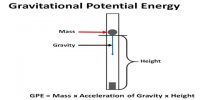In Greek, adiabatic means “nothing passes through”. The process in which pressure, volume and temperature of a system change in such a manner that during the change no heat enters or leaves the system is called adiabatic process. Thus in the adiabatic process, the total heat of the system remains constant.
Let consider a gas in a perfectly thermally insulated cylinder fitted with a piston. If the gas is compressed suddenly by moving the piston downward, heat is produced and hence the temperature of the gas will increase. Such a process is adiabatic compression.
If the gas is suddenly expanded by moving the piston outward, the energy required to drive the piston is drawn from the internal energy of the gas, causing fall in temperature. This fall in temperature is not compensated by drawing heat from the surroundings. This is adiabatic expansion.
Both the compression and expansion should be sudden. so that there is no time for the exchange of heat. Hence, in an adiabatic process always there is the change in temperature.
Expansion of steam in the cylinder of a steam engine, expansion of hot gases in the internal combustion engine, bursting of a cycle tube or car tube, propagation of sound waves in a gas are adiabatic processes.
The adiabatic relation between P and V for a gas, is PVγ = k, a constant
Where γ = [specific heat capacity of the gas at constant pressure/specific heat capacity of the gas at constant volume]
From the standard gas equation, PV = RT
So, P =RT/V
Substituting the value P in,
(RT/V) Vγ = constant
So, T.Vγ-1 = constant
In an Adiabatic process, Q = constant
So, ∆Q = 0
Then, Specific heat capacity, C = ∆Q/m∆T
So, V = 0












